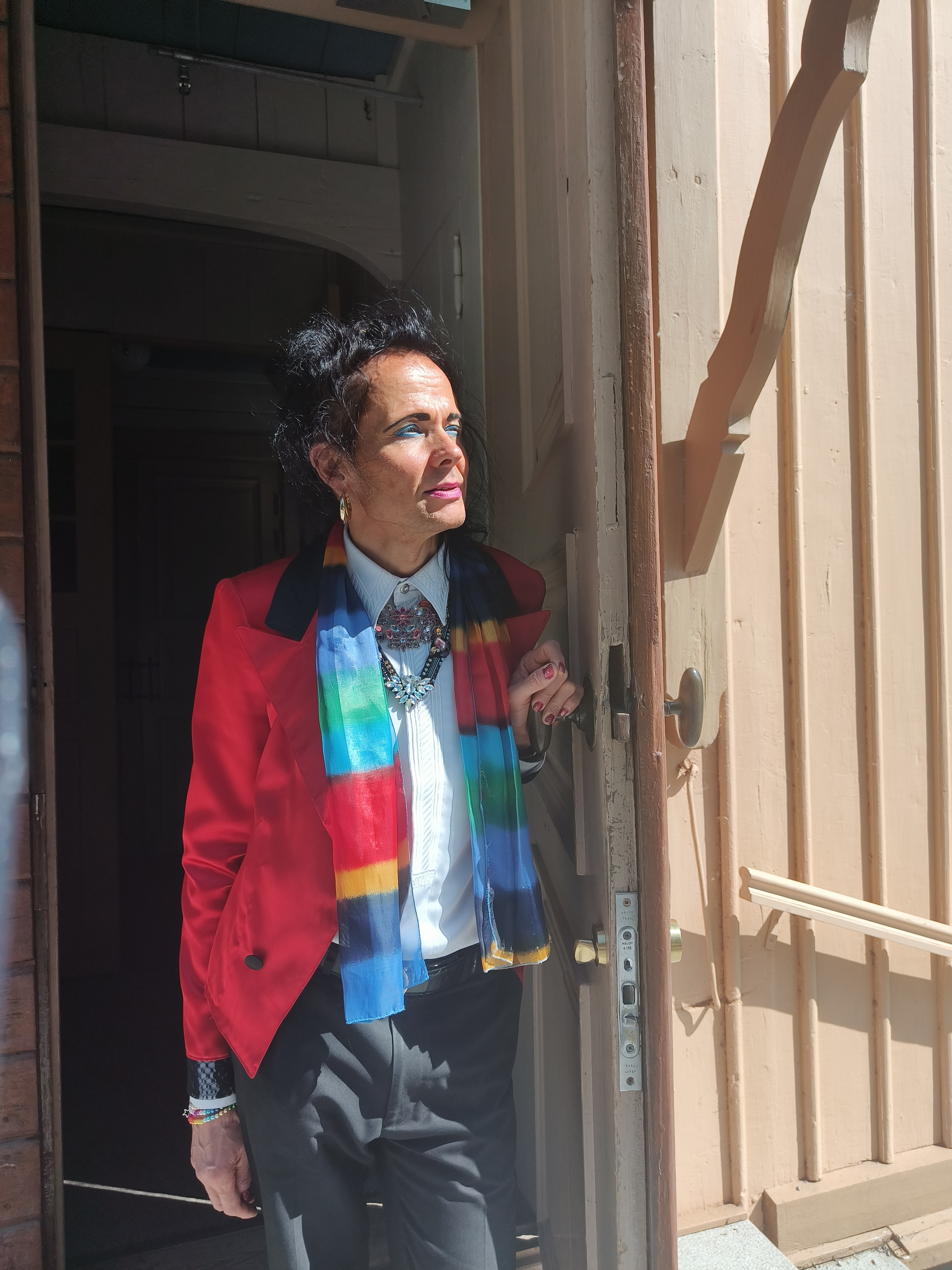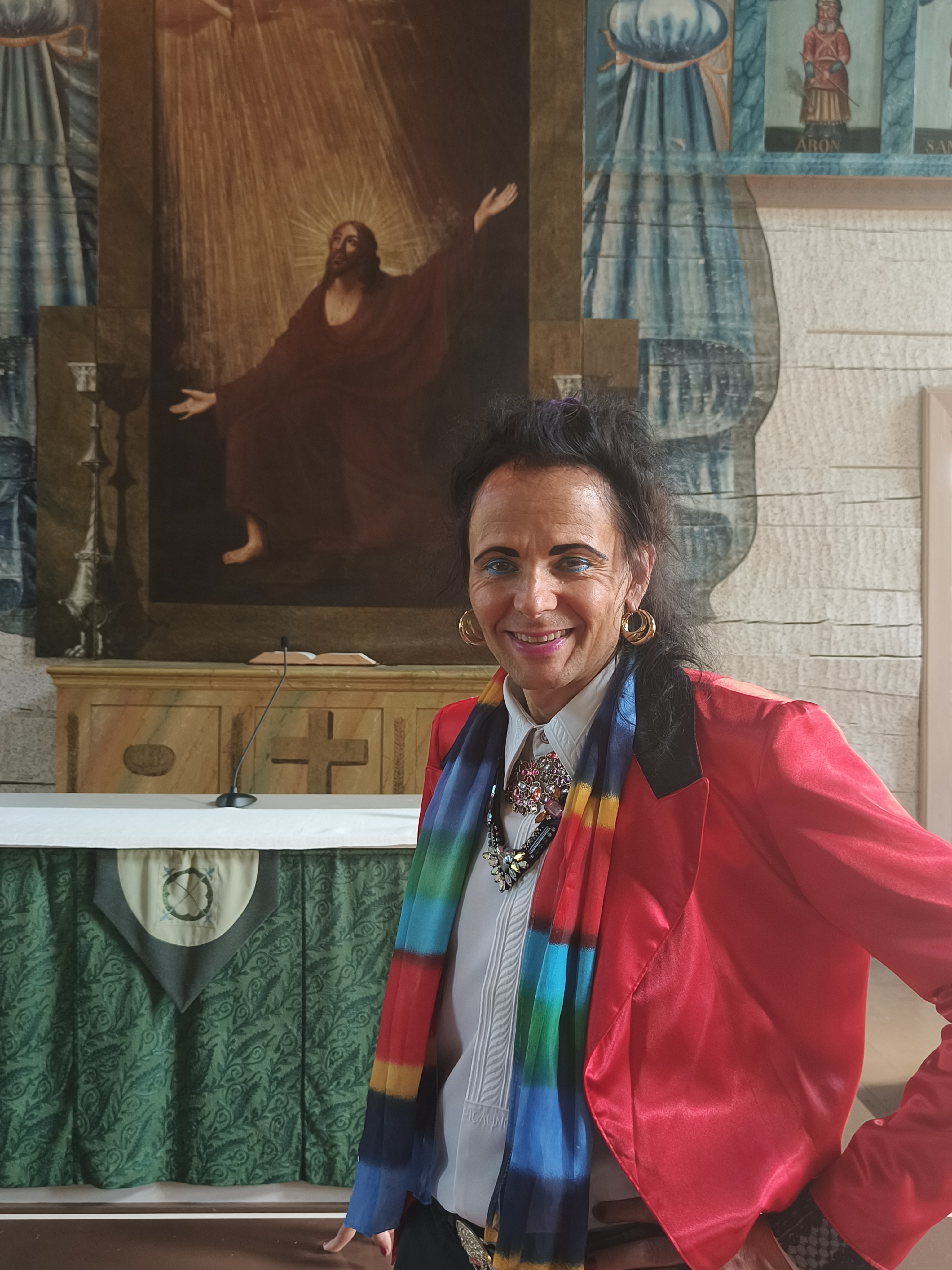
Vicar Harri Henttinen
Biography
Harri Henttinen (he/him/she/her) was born on March 2, 1965, in the city of Tampere, situated in the Finnish Lakeland region of Southern Finland. Her preschool childhood was an idyllic and peaceful experience, with one sister in her family. Harri understood herself as being part of a group of girls, already in elementary school, as she was then a young girl among other girls. The girls in her class accepted Harri warm-heartedly into their company and games. This came to change progressively, as the class grew into adolescence and puberty.
In her secondary school, Harri started to be suddenly outwardly perceived more distinctly as a boy and not as part of the girls anymore. This confused her as internally as she had not changed, yet the way others socially perceived her had shifted significantly. This shift in others’ perceptions perplexed Harri, because swiftly her gender and others' awareness of her were so contradictory to one another. Sadly, Harri was bullied severely in his secondary school education. He felt extremely shy then, and even upheaved on the way to school at this period.
Subsequently, Harri continued his education journey at the Tammerkoski Gymnasium. Tammerkoski Gymnasium was historically known as a girls' college, and its prior name was Tammerkosken tyttölyseo.[1 ] This felt incredibly delightful to her, as Harri felt like she had reached home. Furthermore, Harri experienced a profound spiritual calling to become a priest during his gymnasium time. This impactfully, thoughtful experience enlightened Harri that he would need to become someone who walks with the people, not as a leader but as a fellow advocate in faith.
After receiving the spiritual calling, Harri decided to apply and was accepted into a theology degree program in the University of Helsinki. In the 1970s and 1980s, he was not very expressive and open about his gender orientation outwardly. This came to change during his theological education when Harri gained more self-confidence and started to wear increasingly colourful clothes and jewellery. During this period, there was also intense societal discussion about the Evangelical Lutheran Church of Finland’s ruling to allow women to be ordained as ministers since year 1986.
According to Harri’s autobiography (2024), Harri and others in his theology class needed to undergo an aptitude test to evaluate their inner vocation to become a priest in the Evangelical Lutheran Church of Finland at that time. In this theological vocation test, he was asked whether he liked women or men. Harri had answered this question with a characteristic innocence, stating that he “loved all people in general, both men and women”. This answer ensured Harri’s ordination into the Lutheran priesthood; nonetheless, people who confessed to be homosexuals were not ordained into ministry in the Evangelical Lutheran Church of Finland at the time. Later, Bishop Paavo Kortekangas encouraged Harri by asserting that Harri truly was the kind of man that the Evangelical Lutheran Church needed. (Siistonen 2024, 87-88.)

Harri has worked in Vesilahti, which is a countryside municipality close to Tampere region in Finland, since 1995. In Vesilahti, he began working with the youth pastoring work of the Evangelical Lutheran Church of Finland. According to Harri, the people of Vesilahti region appreciate immensely if one stays hardworking and diligent in their collective capacity, regardless of their outer appearances. Harri has served as a vicar in the Evangelical Lutheran Church of Finland in Vesilahti since 2005. This is when the local children gifted Harri his cherished nickname KirkkoHarri (in English: Harri of the Church), because the children were aware that Harri worked in the local Church as the vicar, yet they could not understand what working as the Vicar entailed fully.
In 2015, Harri initiated a male-only group in Vesilahti Church. A few men had contacted Harri, unbeknownst to one another, to ask if there might be a space for a doubt discussion in the Vesilahti congregation. This led to a male discussion group being formed there, spearheaded by Harri. However, this male discussion group was challenged by a formal complaint issued to the Diocese of Tampere. An unknown person had claimed that this kind of group was, by its essence, heretical and deviating from conventional Lutheran faith. The group’s men were astounded by this claim, and they wanted to deeply support Harri throughout the handling of this formal complaint. So, the group’s men and Harri were called upon to speak with the Bishop leading the Diocese of Tampere. This proved to be a greatly valuable discussion. At the end, the Bishop complimented Harri’s achievement to facilitate such an invaluable space for shared dialogue about observing faith, humane doubt and varied life experiences for the local men.
As for the same-sex discussion in the Evangelical Lutheran Church of Finland, Vicar Harri Henttinen states that the Evangelical Lutheran Church Bishops’ Conference is brave for publishing an open Pastoral recommendation letter about including same-sex couples in the summer 2025. Dating back to 2017, the Finnish government opened marriage legislation to include same-sex couples in Finland. This government’s ruling facilitated debate within the Evangelical Lutheran Church of Finland about the church officiated marriage as well, — leading to this year’s voting of the General Synod. In the Evangelical Lutheran Church of Finland, the Bishops’ Conference had proposed the General Synod vote on two sided approach to marriage, which would have enabled both opposite sex and same-sex marriages to be celebrated in the church. (“The Marriage Law - Evl” 2025.) This Bishop’s Conference’s proposal was later overturned despite winning the majority of votes (Yle News 2025). Afterwards, the Bishops’ Conference published an open Pastoral recommendation letter about including same-sex couples and allowing them to be married in church spaces. Overall, Vicar Harri Henttinen has welcomed this pastoral letter, calling it courageous.

In the Vesilahti congregation, same-sex couples are allowed to enter and be married in the Vesilahti Church space. This was voted on by the congregant council in 2023, which was an invaluable achievement and a brave direction in Vicar Harri Henttinen’s opinion. Nowadays, Vicar Harri Henttinen is also sincerely grateful that the Vesilahti congregation facilitates ‘the Day of Humanity’ Celebration Mass and a festive march. This is a yearly celebration held on 6th of July to commemorate human dignity, shared respect, and humane integrity in Vesilahti. The Day of Humanity is not yet celebrated elsewhere in the world, but Vicar Harri Henttinen hopes dearly that this celebration humankind's compassion could spread in other places too.
Siistonen, Miia. 2024. Harri Henttinen: Sieluni värit. Docendo.
“The Marriage Law - Evl.” 2025. Evangelical Lutheran Church of Finland. May 19, 2025. https://evl.fi/en/current-issues/the-marriage-law/. (Accessed 3.8.2025)
[1 ] “Tammerkosken Lukio - Tampere - Sähköinen Arkisto.” 2025. Disec.fi. Yksa. https://yksa.disec.fi/Yksa4/id/153596158303200/?rd=0. (Accessed 25.7.2025).
(This biographical statement written by Elina Mäkinen from an interview with Harri Henttinen and from the others sources above and was edited by Henttinen.)
Biography Date: August 2025
Tags
Evangelical Lutheran Church of Finland | Ordination/clergy | Clergy Activist | Marriage Equality | Vesilahti | Finland
Citation
“Vicar Harri Henttinen | Profile”, LGBTQ Religious Archives Network, accessed February 28, 2026, https://lgbtqreligiousarchives.org/profiles/harri-henttinen.
Remembrances